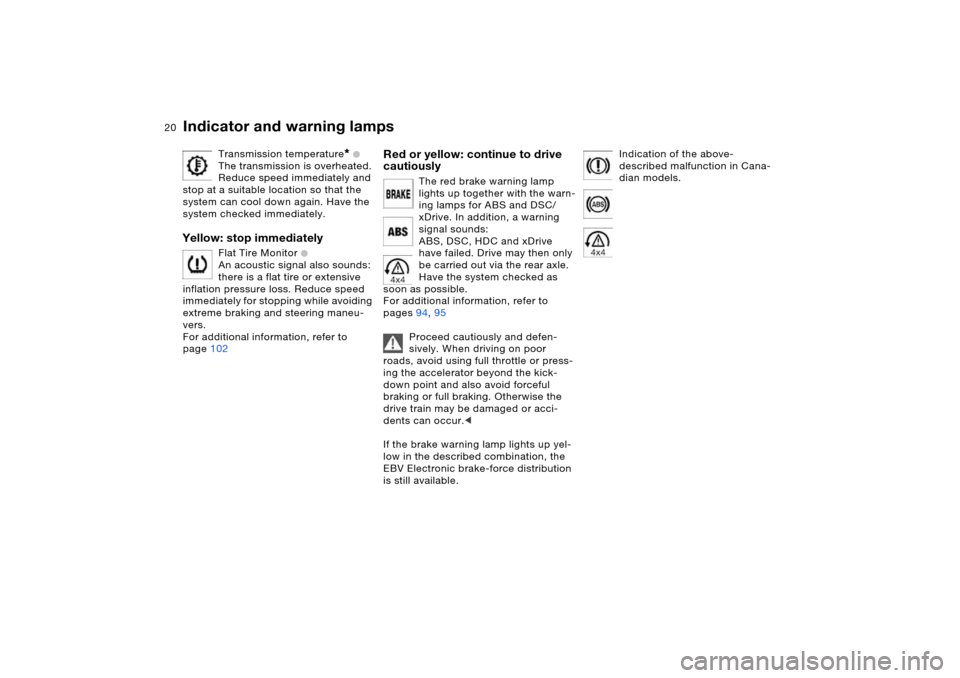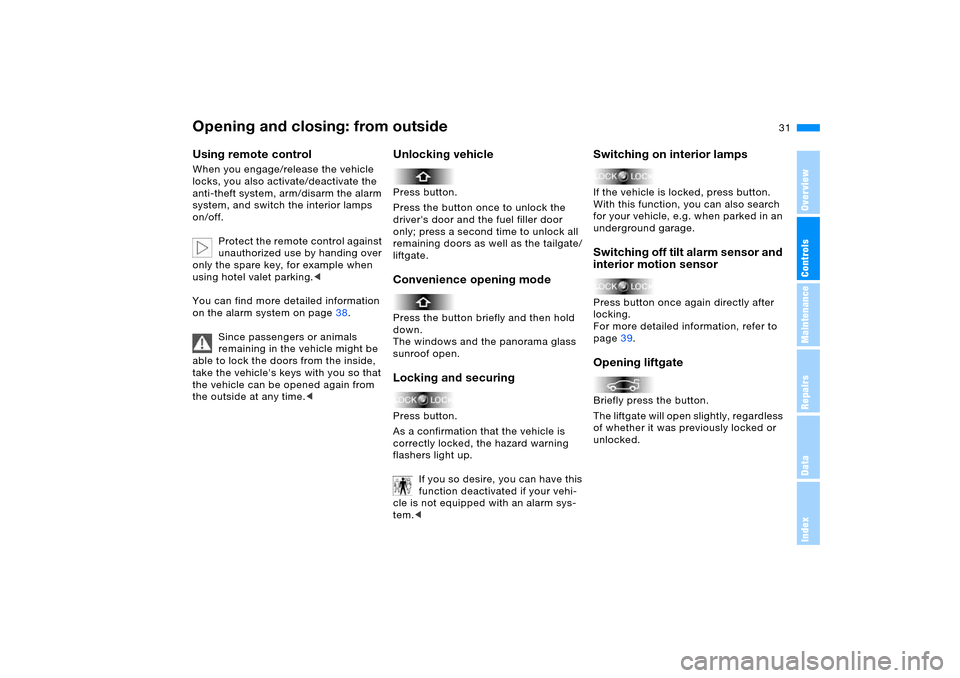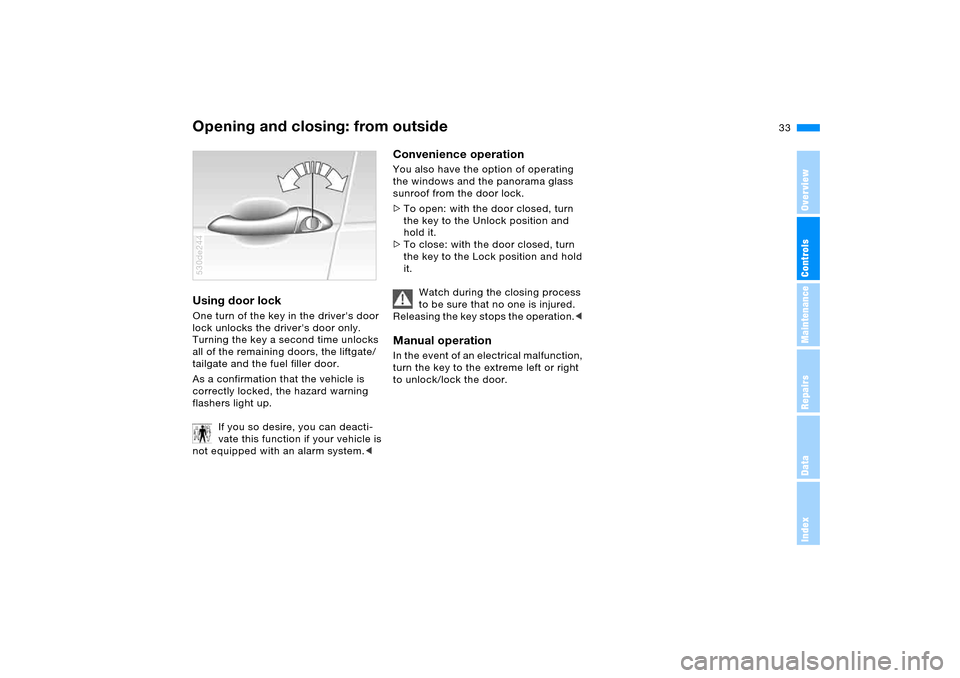2005 BMW X5 4.8IS light
[x] Cancel search: lightPage 5 of 200

5n
OverviewControlsMaintenanceRepairsDataIndex
Controls and features
Passenger safety systems:
Airbags57
Transporting children safely59
Vehicle Memory,
Key Memory63
Driving:
Ignition lock64
Starting engine64
Switching off engine65
Handbrake66
Manual transmission66
Automatic transmission with
Steptronic67
Turn signals/
headlamp flasher70
Washer/wiper system/
rain sensor71
Cruise control74
Everything under control:
Odometer, outside temperature
display76
Tachometer77
Energy control77
Engine oil thermometer78
Fuel gage78
Coolant temperature gage79
Service Interval Display79
Check Control80
Computer82
MID Multi-Information
Display84Digital clock in MID85
Computer in MID88
Technology for safety and
driving convenience:
PDC Park Distance Control 93
Antilock Brake System94
DSC Dynamic Stability
Control95
xDrive97
HDC Hill Descent Control97
Self-leveling suspension98
2-axle self-leveling
suspension99
Brake Force Display101
Flat Tire Monitor101
Lamps:
Parking lamps/low beams103
Adaptive Head Light104
High beams/roadside parking
lamps104
Front fog lamps105
Instrument lighting105
Interior lamps105
Controlling the climate for
pleasant driving:
Air conditioner107
Automatic climate control110
Roller sun blinds115
Independent ventilation116Cabin convenience:
Integrated universal remote
control117
Portable phone119
Glove compartment120
Storage compartments120
Cup holders121
Ashtray, front122
Ashtray, rear122
Cigarette lighter, rear123
Loading and transporting:
Ski bag124
Cargo area
Folding rear backrests
down126
Roll-up cover126
Partition net127
Flaps in cargo area128
Power outlets129
Pull-out floor in cargo
area130
Cargo loading131
Roof-mounted luggage rack133
Page 19 of 200

19n
OverviewControlsMaintenanceRepairsDataIndex
Indicator and warning lamps Technology that monitors itself Indicator and warning lamps that are
identified by
+ are tested for proper
functioning whenever the ignition key is
turned. They each light up once for dif-
ferent periods of time.
If a fault should occur in one of the
monitored systems, the corresponding
lamp does not go out after the engine is
started or it lights up while the vehicle is
moving. You will see how to react to
this in the following section.
Red: stop immediately
Battery charge current
+
The battery is not being
charged. There is a malfunction
of the alternator drive belt or in the
charging circuit of the alternator. Have
the system checked immediately.
If the drive belt is defective, do not
continue driving. The engine could
be damaged due to overheating. If the
drive belt is defective, increased steer-
ing effort is also required.<
Engine oil pressure
+
Stop immediately and switch off
the engine. Check the engine oil
level; top up as required. If the oil level
is correct: have the system checked
immediately.
Do not continue driving. The
engine could be damaged
because of inadequate lubrication.<
Handbrake
*/
brake hydraulic system
+
Lights up with handbrake
engaged.
For additional information, refer to
page66
Comes on although the handbrake is
released: stop immediately. The brake
fluid in the reservoir has fallen to below
the minimum level. At the same time, a
considerably longer brake pedal travel
may be noticeable. Have the system
checked immediately.
During continued driving
increased brake pedal pressure
may be necessary, and considerably
longer braking distances may result.
Please remember to adapt your driving
style accordingly.<
Before continuing your journey, be sure
to read the notes on pages140
and153.
Also comes on in the Check Control
with the message CHECK BRAKE
LININGS.
Indication of the malfunction in
Canadian models described
above.
Page 20 of 200

20n
Indicator and warning lamps
Transmission temperature
* +
The transmission is overheated.
Reduce speed immediately and
stop at a suitable location so that the
system can cool down again. Have the
system checked immediately.
Yellow: stop immediately
Flat Tire Monitor
+
An acoustic signal also sounds:
there is a flat tire or extensive
inflation pressure loss. Reduce speed
immediately for stopping while avoiding
extreme braking and steering maneu-
vers.
For additional information, refer to
page102
Red or yellow: continue to drive
cautiously
The red brake warning lamp
lights up together with the warn-
ing lamps for ABS and DSC/
xDrive. In addition, a warning
signal sounds:
ABS, DSC, HDC and xDrive
have failed. Drive may then only
be carried out via the rear axle.
Have the system checked as
soon as possible.
For additional information, refer to
pages94, 95
Proceed cautiously and defen-
sively. When driving on poor
roads, avoid using full throttle or press-
ing the accelerator beyond the kick-
down point and also avoid forceful
braking or full braking. Otherwise the
drive train may be damaged or acci-
dents can occur.<
If the brake warning lamp lights up yel-
low in the described combination, the
EBV Electronic brake-force distribution
is still available.
Indication of the above-
described malfunction in Cana-
dian models.
Page 21 of 200

21n
OverviewControlsMaintenanceRepairsDataIndex
Indicator and warning lamps Red: an important reminder
Handbrake
*
Lights up with handbrake
engaged.
For additional information, refer to
page66
Handbrake warning lamp
* for
Canadian models
Please fasten safety belts +
Indicator lamp flashes or lights
up. In addition, a signal sounds
and, depending on the equipment, a
message* appears in the Check Con-
trol. Please check safety belts for cor-
rect placement.
The belt memory is activated when the
safety belt on the driver's side has not
yet been fastened.
The belt memory is also active from a
speed of approx. 5 mph/8 km/h when
the passenger belt has not yet been
fastened, heavy objects are placed on
the front passenger seat or passengers
sitting in the front remove their safety
belts.
For additional information on safety
belts, refer to page49
Airbags
+
Malfunction in airbag system.
Have the system checked as
soon as possible.
For additional information, refer to
page57
Yellow: check as soon as possible
DBC Dynamic Brake Control
+
Malfunction in the DBC system.
Please have the system
checked as soon as possible.
For details on DBC, refer to page94
Indication of the above-
described malfunction in Cana-
dian models.
Engine oil level
Comes on while driving: the oil
level is at the absolute minimum;
refill as soon as possible. Do not drive
more than approx. 30 miles/50 km until
you do.
For additional information, refer to
page150
Engine oil level
Comes on after the engine has
been switched off: add engine
oil at your earliest opportunity, e.g.
when you stop to refuel.
For additional information, refer to
page150
Automatic transmission
*
The automatic transmission
switches into the emergency
program due to a fault. Have the system
checked as soon as possible.
For additional information, refer to
page69
Brake pads
* +
Have the condition of the brake
pads checked.
For additional information, refer to
page140
Self-leveling suspension
* +
The self-leveling suspension is
inactive. Have the system
checked as soon as possible.
For additional information, refer to
page98
Page 22 of 200

22n
Indicator and warning lamps
DSC Dynamic Stability Control/
xDrive
+
The warning lamp lights up con-
tinuously and a warning signal sounds:
DSC and HDC or the xDrive 4-wheel
drive system have failed.
The stabilizing interventions of DSC or
the xDrive 4-wheel drive system are no
longer available. Drive may then only be
carried out via the rear axle.
Have the system checked as soon as
possible.
For additional information, refer to
page95
Proceed cautiously and defen-
sively. When driving on poor
roads, avoid using full throttle or press-
ing the accelerator beyond the kick-
down point and also avoid forceful
braking or full braking. Otherwise the
drive train may be damaged or acci-
dents can occur.<
Engine electronics
*
Malfunction in the engine elec-
tronics. You can continue to
drive with reduced engine output or
engine speed. Have the system
checked as soon as possible.
Service Engine Soon
+
If the indicator lamp lights up
continuously or intermittently,
there is a fault in the exhaust-relevant
electronic systems. Although the vehi-
cle remains operable, the system must
be checked as soon as possible.
For additional information, refer to
page155
Indication of the above-
described malfunction in Cana-
dian models.
Check Gas Cap
* +
Warning lamp lights up. Fuel
filler cap is not properly closed
or is missing. Check whether the fuel
filler cap is properly closed.
For additional information, refer to
page25
Green: for your information
Turn signals
Flashes when the turn signals
are operated. Rapid flashing
indicates a system malfunction.
For additional information, refer to
page70
Cruise control
*
Lights up when system is
switched on: ready for operation
using the buttons on the steering
wheel.
For additional information, refer to
page74
Fog lamps
Lights up when fog lamps are
switched on.
For additional information, refer to
page105
Blue: for your information
High beams
Lights up when the high beams
are on or the headlamp flasher
is actuated.
For additional information, refer to
pages70, 104
Page 31 of 200

OverviewControlsMaintenanceRepairsDataIndex
31n
Opening and closing: from outsideUsing remote control When you engage/release the vehicle
locks, you also activate/deactivate the
anti-theft system, arm/disarm the alarm
system, and switch the interior lamps
on/off.
Protect the remote control against
unauthorized use by handing over
only the spare key, for example when
using hotel valet parking.<
You can find more detailed information
on the alarm system on page38.
Since passengers or animals
remaining in the vehicle might be
able to lock the doors from the inside,
take the vehicle's keys with you so that
the vehicle can be opened again from
the outside at any time.<
Unlocking vehiclePress button.
Press the button once to unlock the
driver's door and the fuel filler door
only; press a second time to unlock all
remaining doors as well as the tailgate/
liftgate. Convenience opening modePress the button briefly and then hold
down.
The windows and the panorama glass
sunroof open. Locking and securing Press button.
As a confirmation that the vehicle is
correctly locked, the hazard warning
flashers light up.
If you so desire, you can have this
function deactivated if your vehi-
cle is not equipped with an alarm sys-
tem.<
Switching on interior lamps If the vehicle is locked, press button.
With this function, you can also search
for your vehicle, e.g. when parked in an
underground garage.Switching off tilt alarm sensor and
interior motion sensor
Press button once again directly after
locking.
For more detailed information, refer to
page39. Opening liftgate Briefly press the button.
The liftgate will open slightly, regardless
of whether it was previously locked or
unlocked.
Page 33 of 200

OverviewControlsMaintenanceRepairsDataIndex
33n
Opening and closing: from outsideUsing door lock One turn of the key in the driver's door
lock unlocks the driver's door only.
Turning the key a second time unlocks
all of the remaining doors, the liftgate/
tailgate and the fuel filler door.
As a confirmation that the vehicle is
correctly locked, the hazard warning
flashers light up.
If you so desire, you can deacti-
vate this function if your vehicle is
not equipped with an alarm system.< 530de244
Convenience operation You also have the option of operating
the windows and the panorama glass
sunroof from the door lock.
>To open: with the door closed, turn
the key to the Unlock position and
hold it.
>To close: with the door closed, turn
the key to the Lock position and hold
it.
Watch during the closing process
to be sure that no one is injured.
Releasing the key stops the operation.< Manual operation In the event of an electrical malfunction,
turn the key to the extreme left or right
to unlock/lock the door.
Page 35 of 200

OverviewControlsMaintenanceRepairsDataIndex
35n
LiftgateOpening from outside Press the button, refer to arrow:
The liftgate opens slightly.
The cargo area is illuminated whenever
the liftgate is opened, refer also to
page105.
With the liftgate open, the dis-
tance from the ground to the
upper edge is more than 6.6 ft/2 m.
Please consider this, e.g. when opening
the liftgate in a garage.<530de245
Opening from inside Press this button to open the liftgate
when the vehicle is stationary.
If pointed or sharp-edged objects
could strike the rear window while
driving, be sure to provide protection
around all edges. If you do not do this,
the heating conductors of the rear win-
dow could be damaged.<
For information on the cargo area cover
and on other details in the cargo area,
refer to Cargo area, beginning on
page126.530de415
Manual release In the event of an electrical malfunction,
you can release the liftgate manually:
1. Remove the plastic plug from inside
the cargo area and pull toward the
interior, refer to arrow. The liftgate
will be released
2. Reinstall the plug. 530de316